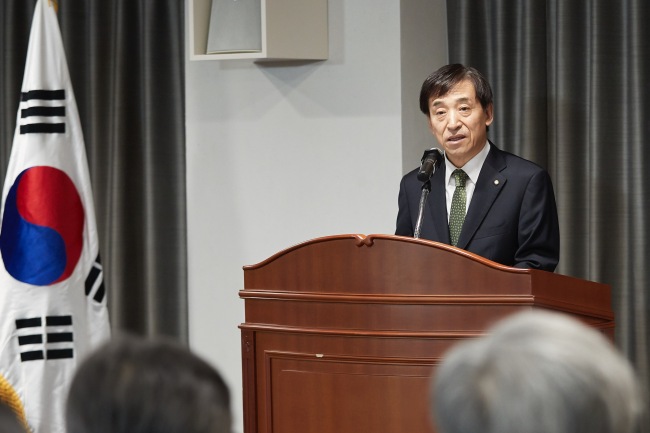BOK chief stresses change, innovation in extended term
By Bae Hyun-jungPublished : April 2, 2018 - 17:54
The central bank chief on Monday pledged to focus on change and innovation, signaling a more active and practical policy approach in the next four years compared to his initial first term in office.
“For the past four years, we have placed focus on aligning the organization but from now on (we) will seek change and innovation,” Bank of Korea Gov. Lee Ju-yeol told reporters after his inauguration ceremony, starting his second term in office.
Lee, who is the first BOK chief in 44 years to serve the top monetary policymaker post for two consecutive terms, said that it is now time for the central bank’s policy tone to move from stability to innovation.
“For the past four years, we have placed focus on aligning the organization but from now on (we) will seek change and innovation,” Bank of Korea Gov. Lee Ju-yeol told reporters after his inauguration ceremony, starting his second term in office.
Lee, who is the first BOK chief in 44 years to serve the top monetary policymaker post for two consecutive terms, said that it is now time for the central bank’s policy tone to move from stability to innovation.

“The central bank will set an example (to the private sector) by working in an efficient and speedy manner,” Lee said.
“It is true that as the nation’s central bank, we are always required to take caution and double check. But there must be ways to promote efficiency without harming such essential prudence.”
The BOK should also open itself up to sound criticism and opinions from outside to avoid stagnation, according to the monetary chief.
The BOK chief also gestured at actively participating in the nation’s economic road map at the cost of taking issue with other policymakers down the road.
“I will constantly analyze economic agendas, explore practical alternative solutions, and put them forward to policymakers,” Lee said.
“Short-term policy responses are, of course, important in dealing with current risks but in the long-term perspective, the issue of solving our economy’s structural vulnerability can be delayed no longer.”
He thereby called for expansionary fiscal policies to keep pace with the ongoing and incoming monetary policy trend.
“We are currently in a situation in which monetary policies are expected to revitalize the economy and to maintain financial stability at the same time,” Lee said.
During the past 10 years since the global financial crisis, most of the policy burden has been placed on the monetary authorities but it is now time for the fiscal sector to step up, according to the bank chief.
“Major countries including the United States are moving for fiscal expansion, which I believe is the right way to go,” Lee said.
Citing South Korea’s fiscal soundness and strong economic fundamentals, the governor alluded that Seoul’s government has sufficient room for further spending.
The central bank earlier was speculated to carry out an additional base interest hike as early as April, in step with the global economic upturn and the US Federal Reserve’s rate increase, but Lee continued to remain prudent over the next move.
In November last year, the BOK raised the nation’s policy rate from the record-low 1.25 percent to 1.5 percent, marking the first hike for more than six years.
“We shall maintain easing monetary policies so as to prop up our economy’s growth trend but will have to make careful judgments on adjusting the level of easing in accordance to the changes of the real economy and of the financial market,” Lee said.
Concerning the latest Seoul-Washington deal to improve the transparency of the foreign exchange market here, the BOK leader stressed that the central bank has complied with the principles of a free market.
“It is true that we have been blamed (for interfering in the currency market) because of our current account surplus, but we have never used policy tools to target foreign exchange rates,” Lee said.
Seoul’s current account surplus is about 7 percent of its gross domestic product, visibly exceeding the 3 percent cap which the US government established as one of the prerequisites of designating a currency manipulator country. Since October last year, Asia’s fourth-largest economy has been included on the US’ watch list on currency manipulation.
By Bae Hyun-jung (tellme@heraldcorp.com)







![[Graphic News] More Koreans say they plan long-distance trips this year](http://res.heraldm.com/phpwas/restmb_idxmake.php?idx=644&simg=/content/image/2024/04/17/20240417050828_0.gif&u=)
![[KH Explains] Hyundai's full hybrid edge to pay off amid slow transition to pure EVs](http://res.heraldm.com/phpwas/restmb_idxmake.php?idx=644&simg=/content/image/2024/04/18/20240418050645_0.jpg&u=20240419100350)





![[From the Scene] Monks, Buddhists hail return of remains of Buddhas](http://res.heraldm.com/phpwas/restmb_idxmake.php?idx=652&simg=/content/image/2024/04/19/20240419050617_0.jpg&u=20240419175937)

![[KH Explains] Hyundai's full hybrid edge to pay off amid slow transition to pure EVs](http://res.heraldm.com/phpwas/restmb_idxmake.php?idx=652&simg=/content/image/2024/04/18/20240418050645_0.jpg&u=20240419100350)

![[Today’s K-pop] Illit drops debut single remix](http://res.heraldm.com/phpwas/restmb_idxmake.php?idx=642&simg=/content/image/2024/04/19/20240419050612_0.jpg&u=)